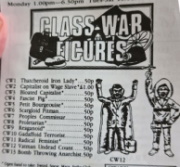(Thread IKs:
dead gay comedy forums)
|
@MAGAcommunists is such a blatant bot / op account come on man
|
|
|
|

|
| # ? May 20, 2024 20:32 |
|
Marxs' theory of money only applies to capitalist societies and he says only came into being as capitalism developed so the factual origins of pre-capitalist societies having and using coins and tokens and whatever doesn't really have any implications for his theories. It's good knowledge to have to understand the development of private property and older class societies though.
|
|
|
|
Aeolius posted:This seems to argue both things at once; do we mean Marx's argument is a logical one, or a wrong-historical one? Is there a passage you'd highlight as particularly egregious? This is what I mean. https://www.youtube.com/watch?v=zwuMrd_Hgww
|
|
|
|
MLSM posted:@MAGAcommunists is such a blatant bot / op account come on man https://twitter.com/MAGACommunists/status/1567179125420617733
|
|
|
|
namesake posted:Marxs' theory of money only applies to capitalist societies and he says only came into being as capitalism developed so the factual origins of pre-capitalist societies having and using coins and tokens and whatever doesn't really have any implications for his theories. yeah i don't think marx and graeber contradict as such. the historical origins of money as a means of doing business with people you can't trust you'll ever see again or as a means of automating and decentralizing army or other state infrastructure funding jives perfectly well with money's role in capitalism as an unavoidable and indeed increasingly important element of capital's continuous and cyclic metamorphoses
|
|
|
|
Marx didn't know about how financialzed the Iron Age Phonesians were. If he did how would he or an Orthodox Marxist explain why their economic system of joint stock trading/investment companies didn't take off and take over everything. The material infrastructure wasn't there?
|
|
|
|
War and Pieces posted:Marx didn't know about how financialzed the Iron Age Phonesians were. If he did how would he or an Orthodox Marxist explain why their economic system of joint stock trading/investment companies didn't take off and take over everything. The material infrastructure wasn't there? I'll shoot from the hip because I don't know anything about that time period but it's probably the same reason that the great merchant houses of Venice didn't lead to a permanent change in class society - if the basis of your enterprise is getting rich through trade then your root strength is basically arbitrage: you can take items which you can buy cheap to where you can sell them dear. This requires highly separated spheres of production and sale like trading over an ocean as the more merged they become the less benefit the trader can get. Capitalism as a system is based on altering the sphere of production and then expanding everywhere while that sort of trade relies on keeping things seperate. So a trader syndicate is actually very happy within the class structure it starts in, doesn't have a political economic necessity to reshape production everywhere around itself and is stronger the more fragmented the world is meaning it can be very powerful but will never be revolutionary.
|
|
|
|
War and Pieces posted:Marx didn't know about how financialzed the Iron Age Phonesians were. If he did how would he or an Orthodox Marxist explain why their economic system of joint stock trading/investment companies didn't take off and take over everything. The material infrastructure wasn't there? tihis. to be faier, much of de reserch inta phoneticicean was only happening after de big marxos had gone to the pearly gates and been ticketed, so we can't judge the prophet for things people of his time were too stupid to understand. although it must be said, the incredible success of the carthagonia LLC in the London stock exchange of his time should've been a clue big enough (USER WAS PUT ON PROBATION FOR THIS POST)
|
|
|
|
lollontee posted:tihis. to be faier, much of de reserch inta phoneticicean was only happening after de big marxos had gone to the pearly gates and been ticketed, so we can't judge the prophet for things people of his time were too stupid to understand. although it must be said, the incredible success of the carthagonia LLC in the London stock exchange of his time should've been a clue big enough Welcome back lollontee
|
|
|
|
Someone should write a version of Capital but like updated for the 21st century
|
|
|
|
Communist Thoughts posted:Someone should write a version of Capital but like updated for the 21st century Yeah it's called Capital.
|
|
|
|
Communist Thoughts posted:Someone should write a version of Capital but like updated for the 21st century Hmm... Atrocious Joe posted:Capital in the 21st Century is an update so people don't need to read Capital 1-3.
|
|
|
|
Communist Thoughts posted:Someone should write a version of Capital but like updated for the 21st century capital still does a very good job of describing all the mechanisms of capital, which is the purpose of the books. it doesn't need a replacement. for some, it needs a companion book, of which there are many. others might need a reading group or someone willing to mentor them. if you consider yourself (speaking generally here) an anti-capitalist - rather than someone with an anti-capitalist affectation or sympathy - its the definitive work on the subject. if you're serious about anti-capitalism and ending the dictatorship of the bourgeoisie, its insane not to. if you find it difficult, thats normal. there are resources available to you. but giving up because the text is challenging, thats loser poo poo to me
|
|
|
|
Fat-Lip-Sum-41.mp3 posted:Marx could not have known about contemporary modern scholarship into the origins of credit and money. His argument is a logical one, not historical. I think it's fair to say that it's simply wrong, but wrong or not the true origins of money have very little to do with his critique of Capitalism. Yeah Graeber is good! Although it’s been years since I read him. I am curious about this Kuruma guy’s take—-I don’t anticipate something as anthropological, but instead a focus on what confused one guy in my last Capital reading group, like “why gold?!?!”
|
|
|
|
Sunny Side Up posted:Yeah Graeber is good! Although it’s been years since I read him. I am curious about this Kuruma guy’s take—-I don’t anticipate something as anthropological, but instead a focus on what confused one guy in my last Capital reading group, like “why gold?!?!” gotta tell that guy to stick around for the Grundrisse reading group
|
|
|
|
Communist Thoughts posted:Someone should write a version of Capital but like updated for the 21st century it's just capital, but find&replaced yards of linen with packs of lootboxes
|
|
|
|
Communism is the same as capitalism because the communist leaders still live in luxury while the poor continue to suffer. Capitalism raised plenty of people out of poverty, communism isn't the only system that did it. At least we can access information freely, in China they're blocked and too scared to access information. We stopped putting people in concentration camps nearly 100 years ago. Immigration detention isn't the same as forcing muslims into camps and shaving their heads.
|
|
|
|
I shouldn't engage but that's what I got back after saying we need to stop trying to piss off the worlds next superpower.
|
|
|
|
droll posted:I shouldn't engage but that's what I got back after saying we need to stop trying to piss off the worlds next superpower. Actually did you know china will have only 100 million people by 2030 because nobody is allowed to succ and fucc under communism
|
|
|
|
Variable and Constant Capital Now that we have the nature of labour established, we can use this as a basis for defining a few other concepts related to capital. Namely, Variable Capital and Constant Capital. Variable Capital arises from the fact that the value added to a commodity by labour-power is not a constant. It will be greater or lesser based on a variety of factors including the skill of the individual worker, the worker’s mood or state of health, or even things like hot weather affecting the worker’s work-pace. Constant Capital is the value added to production by money spent on production resources. This will largely be the same from one day to the next, and even if it varies (e.g., the price of beef goes up), every capitalist will be paying roughly the same price for the same production resources.  This allows us to look at the formation of surplus value from a new angle. Let’s go back to production resources and the idea that they cannot add surplus value, they just add regular, old, everyday value. Tools and accessories are purchased by the capitalist to provide them to a hired worker so the worker can use them to produce a commodity for later exchange. The capitalist pays for all of these what they are worth... An exchange of equivalents, money for an equal amount of embodied abstract labour. Let’s imagine that a capitalist somewhere buys exactly enough resources to make 500 automobiles for $1 million. Once the 500th vehicle is produced, every machine, every tool, every bit of raw resources are completely used up. Let’s further assume that the total value for all of this stuff (what the capitalist paid for it) is a cool million. If the total value of the vehicles is the quantity of average labour socially required to produce them, how much value will be added by the machinery and materials? Exactly as much as this equipment actually contains. The capitalist, in this case, paid for a specific sum of abstract labour, which is then transformed into the end product. The total value of the cars has to be the sum of: the number of average labour-hours expended in producing the equipment, and the number of average labour-hours expended in assembling the automobile. Once produced, the number of labour-hours will not change. If the cars sell for $4 million, then we can be sure that the value added by the workers is $3 million. We already know how much average labour went into the equipment: $1,000,000. The equipment was a known factor going into it because the value was already set by prior labour-hours. The formula Marx uses to represent this relationship between constant capital, variable capital, and surplus value is: c + v -› c + v + s We can dispense of dollar amounts and view this phenomenon through labour-hours, as well. Let’s say it takes 200 hours of socially-necessary, average labour-power to turn the raw materials into the car-making machinery, and the labour-time necessary to reproduce the labour (i.e., the equivalent labour-hours to the wages they receive) is 80 hours of labour-time. This gives you a surplus value of 120 hours of labour-time. If the automobile-making equipment takes 500 hours to use up making cars, what quantity of socially-necessary labour-time goes into the cars? 200 + 500 = 700. Exactly 700 labour-hours are required to produce and use the means of production for the production of cars for sale. All socially required labour-power is now present and accounted for. But how much surplus value is generated in this car-making process? Once again, we need to look at the labour-hours necessary to reproduce the labour. If necessary labour-time – the value of labour-power – equals 150 average labour-hours, and total labour-time – the value of the product – equals 500 average hours, the difference is surplus value: 500 – 150 = 350. Assuming that the workers receive the equivalent (in wages) of 150 labour-hours, the capitalist thus accrues the equivalent (in money) of 350 labour-hours in surplus value. The means of production don’t add to this surplus value. It does add value! The total value of the cars include the labour-time embodied in creation the means of production, which is added to the 500 hours spend using the means of production to get the cars ready to be sold as commodities. Thus, the total value of the cars = 700 labour-hours. Means of production, used up in production, add just the value they contain over the span of their lifetime: in our example, 200 labour-hours. (It’s worth noting, they’ll also require another 200 labour-hours for the capitalist to replace them.) For surplus value to exist, the capitalist requires labour. Without labour, capitalists cannot exist!
|
|
|
|
whats the marxist line on commodities that dont have use value? like my dogina coins, which aren't even really produced by human labour e: also whats the best translation of Capital? The version i'm reading has a really stilted and confusing translation, i'm used to reading complicated stuff you've got to read a couple times to understand but I feel like a lot of the info is being obscured by poor translation that makes sentences ambigious or is that just how Marx writes? like at one point i had to really dig my heels into a paragraph to figure out what he was talking about and afaict all he was saying was "if you produce more coats the total value of all the coats you have goes up" Communist Thoughts has issued a correction as of 13:02 on Sep 7, 2022 |
|
|
|
The copy I'm using is translated is published by Wordsworth Classics of Literature and translated by Stephen Moore, Edward Aveling, and Ernest Untermann. No idea how it stacks up to other translations, though.
|
|
|
|
Bitcoin is a commodity, but not a commodity like a phone or a video game. It's a commodity along the line of fiat money - an attempt to build a new super-commodity. And in that role, it's exceptionally bad at performing the most basic functions of money. Speculation skews exchange value this way and that, and crypto currencies have been subject to massive amounts of speculation. But speculation adds nothing to an economy: What one person gains in speculation, another needs to lose over time. It's profit only in the most vulgar sense. eta: I'll give crypto this, though: It's lasted longer than tulip mania, which is my immediate mental comparison in terms of speculative bubbles.
|
|
|
|
But does bitcoin, and money for that matter, not have a use value then? It's use value can't be its exchange value and as far as I can see all there is to it is its exchange value. I haven't got to marx talking about money yet so maybe he goes over that E I guess presumably money isn't classed as a commodity Communist Thoughts has issued a correction as of 15:23 on Sep 7, 2022 |
|
|
|
Communist Thoughts posted:But does bitcoin, and money for that matter, not have a use value then? It's literally wasted electricity. It has the opposite of use value.
|
|
|
|
Communist Thoughts posted:But does bitcoin, and money for that matter, not have a use value then? Money is a commodity set aside from all other commodities and given the role of the universal equivalent, the commodity through which the values of all other commodities can be described. It can have some use value, in the sense that gold is used as money and is electroconductive and malleable to shaping. But this use value is divorced from its exchange value in a way not true for other commodities. You do not acquire gold so you can make fancy trinkets, you acquire it so you can purchase commodities that do have some use value. Fiat currency and bitcoin essentially do not have a use value but this does not affect their ability to act as money.
|
|
|
|
Money is the unity of exchange and use-value, while having none of the latter inherently.The Grundrisse posted:Just as exchange value, in the form of money, takes its place as the general commodity alongside all particular commodities, so does exchange value as money therefore at the same time take its place as a particular commodity (since it has a particular existence) alongside all other commodities. An incongruency arises not only because money, which exists only in exchange, confronts the particular exchangeability of commodities as their general exchangeability, and directly extinguishes it, while, nevertheless, the two are supposed to be always convertible into one another; but also because money comes into contradiction with itself and with its characteristic by virtue of being itself a particular commodity (even if only a symbol) and of being subject, therefore, to particular conditions of exchange in its exchange with other commodities, conditions which contradict its general unconditional exchangeability. Money, man. Money's weird. ETA: Or, y'know, what unwantedplatypus said.
|
|
|
|
Communist Thoughts posted:But does bitcoin, and money for that matter, not have a use value then? afair money is a different kind of value that is commodified but is not a regular commodity, it's a super-commodity that acts as the measurement of exchange value. It doesn't have its own intrinsic value because there's essentially no use value in a banknote unless you want to burn it for fuel or use it to wipe your rear end or something (both of which are related to the material the banknote is made from rather than the banknote itself), and there's even less use value in a bunch of computer code saying you have $10 in your chequing account. but it is still commodified as a super-commodity that you can use to exchange one commodity for another in the same way you could directly exchange one commodity for another in a barter economy. And, in fact, in developed capitalism you have to use the super-commodity money to exchange one commodity for another because you can't go into Best Buy and offer to give them 12 dozen eggs for a bluetooth speaker even if the exchange value of 12 dozen eggs and a bluetooth speaker are exactly equivalent in dollars and cents bitcoin is an attempt to supplant current forms of money as the super-commodity, but a very bad and stupid one I think the crux of the matter here is that super commodities like dollars or euros or bitcoins don't need a use value to be important to the functioning of a capitalist economy by facilitating commodity exchange, but because they are super commodities without use values, their circulation facilitates the functioning of the commodity system but doesn't add anything to it. you can speculate on bitcoin the same way you could speculate on the euro or the ruble, but the increasing dollar value of any of those super-commodities doesn't represent an increasing use or exchange value, it's just transferring money from one the buyer's bank account to the seller's vyelkin has issued a correction as of 15:40 on Sep 7, 2022 |
|
|
|
Falstaff posted:Money is the unity of exchange and use-value, while having none of the latter inherently. What does this mean: quote:Money (...) confronts the particular exchangeability of commodities as their general exchangeability, and directly extinguishes it I don't know what confront means in this context, or grammatically where "as their general exchangability" fits in, is it referring to money or the commodities? Is it saying Money replaces the specific exchange value of commodities between eachother by acting as a general medium of exchange? This is what I was talking about with the translation stuff, it's hard to parse what's even being written before you get to the concepts.
|
|
|
|
Communist Thoughts posted:Is it saying Money replaces the specific exchange value of commodities between eachother by acting as a general medium of exchange? yes it says that in a barter economy, commodities are particularly (i.e., specifically) exchangeable. You can go to the bluetooth speaker dealer and give them 12 dozen eggs and get a bluetooth speaker. You have made a particular exchange of one specific commodity for another. money replaces particular exchangeability with general exchangeability. it replaces the specific exchange value of 12 dozen eggs with $60 and the specific exchange value of a bluetooth speaker with $60. by doing so, money also extinguishes particular exchangeability. you can no longer go to the bluetooth speaker dealer and give them your 12 dozen eggs. first, you have to find someone willing to give you $60 for those eggs, and then you can go to the bluetooth speaker dealer and give them your $60 for their bluetooth speaker by becoming a general medium of exchange, money extinguishes the prospect of a barter economy because it becomes the universal measurement of exchange value and thus the universal method of exchanging commodities
|
|
|
|
Falstaff posted:Bitcoin is a commodity, but not a commodity like a phone or a video game. It's a commodity along the line of fiat money - an attempt to build a new super-commodity. And in that role, it's exceptionally bad at performing the most basic functions of money. Agreed that bitcoin is a commodity, no matter how stupid a commodity; the fact that it's virtual and based to some extent on a big RNG doesn't change the social qualities of it, the value of inputs, etc. So I'd consider it as sort of a "collectible" substance that is also highly divisible. Like a weird fractal hummel figurine or something. That said, it's worth noting that fiat money differs from this in that it's even less of a commodity than bitcoin, which is to say not one at all; it's not produced to be "sold" on a market as such. It just takes on the relevant qualities indirectly through floating exchange rates. The MMT/Chartalist/Knapp point about adequate demand for this function essentially being enforced through tax liabilities is, I think, hard to argue against. We can get into abstractions like whether fiat tokens are also "collectibles" (sure!), but usually in order for those qualities to take on appreciable social weight and express themselves in higher demand, you usually have to get into the territory of decommissioned or rare currency, since a freshly-minted dollar stuck in a frame and hung on a wall is still worth exactly $1.
|
|
|
|
Aeolius posted:The MMT/Chartalist/Knapp point about adequate demand for this function essentially being enforced through tax liabilities is, I think, hard to argue against. Would you care to summarize this argument? I'm not familiar with it.
|
|
|
|
Falstaff posted:Variable and Constant Capital one thing i remember marx really stressing on this subject was the fact that human labor simultaneously transforms and creates value. like if you give a carpenter really rare and precious wood as opposed to really cheap and common wood and have him spend five hours turning the provided material a chair, he'll be adding five hours of labor no matter what, but the resulting commodity might be worth 1 + 5 = 6 or 100 + 5 = 105. i get the sense that a lot of marx's contemporaries didn't really understand this and were like "wow! capitalist A is producing so much more value than capitalist B!" such that marx was furiously rubbing his temple and pacing in his study
|
|
|
|
Mr. Lobe posted:It's literally wasted electricity. It has the opposite of use value. The use value is that's supposed to be able to make untraceable purchases on the black market. but even if we accept that at face value it's only useful because economically arbitrary decision to make certain purchases illegal
|
|
|
|
Aeolius posted:Agreed that bitcoin is a commodity, no matter how stupid a commodity; the fact that it's virtual and based to some extent on a big RNG doesn't change the social qualities of it, the value of inputs, etc. So I'd consider it as sort of a "collectible" substance that is also highly divisible. Like a weird fractal hummel figurine or something. Fiat money is still a representation of crystallized labor time, and is still produced for its use as exchange value. Two things that are worth $15 both have accrued an amount of labor time in their production equivalent to $15. Their values are equivalent to each other and to $15. Is it possible for something to be a commodity without a physical form? If so, I think fiat money would be a commodity. Not having it tied to a physical production process (or a minimal one during the paper era) means you can do some cool tricks with it, but I don't think anything fundamental has changed. Like currency inflation is just reducing the amount of labor time represented by any one dollar. If you haven't changed the total amount of social labor-time in a currency-sphere, then the value of each individual dollar must go down as each now represents less labor time than previously. If gold coins were used as money, but not raw gold; would that be a commodity? Since the value of the gold coins, while backed by the value of raw gold, is not actually the value of mining and refining and shaping the gold; but rather a pre-determined value. You can start tracking wealth on a ledger, and at this point transfers of "money" do not necessitate physical transfers of gold. For the time periods where gold coinage was in use, that was probably not the norm for laborers, but what about banks and the wealthy? I'm new to this please correct me if I'm wrong unwantedplatypus has issued a correction as of 19:34 on Sep 7, 2022 |
|
|
|
Falstaff posted:Would you care to summarize this argument? I'm not familiar with it. A quick and dirty summary. It's the anthropological, bronze age palaces and temples argument again. The origins of money, insofar as we know it and use it, arises from accounts kept by the temples in the bronze age. The priesthood kept the calendar (which told everyone when to plant), established the systems of measurement, managed the production of ale (potable beverages, very important), and managed the production of precious metals to verify their purity for the purpose of trade with other city states. The temple answers more or less to the palace. You're a farmer, you need ale. During the planting season, you get your ale from the alehouse. The alehouse is run by the temples. You don't have money. You have wheat that is growing. You run up a tab. Come harvest, the temple takes its cut out of what was produced at threshing time. The next step: instead of keeping ledgers, mint a coinage that is symbolic of your credit with the temple. The palace and temples create this currency, spend it into the populace (maybe they're buying excess grain for their own granaries). And voila, you can use it to pay the state what you owe. It has value because you can use it to pay, in so many words, Taxes. And because it can be used to pay Taxes, individuals will trade it amongst themselves in the market. It becomes the commodity of universal exchange. Fat-Lip-Sum-41.mp3 has issued a correction as of 19:42 on Sep 7, 2022 |
|
|
|
I think "money as debt" and "money as supercommodity" are both true
|
|
|
|
unwantedplatypus posted:Two things that are worth $15 both have accrued an amount of labor time in their production equivalent to $15. Their values are equivalent to each other and to $15. This part of the labour value theory I don't really get at the moment, because plenty of things that take less labour are sold for more than things that took more or the same labour to produce. Or are we talking some idealised value thats seperate from their actual value at sale?
|
|
|
|
Communist Thoughts posted:This part of the labour value theory I don't really get at the moment, because plenty of things that take less labour are sold for more than things that took more or the same labour to produce. "Simple" labor. Not all labor is equal. Marx acknowledges that some labor may be "complex" and therefore an hour of "complex" labor is worth X hours of "simple" labor. These terms are not exactly defined.
|
|
|
|

|
| # ? May 20, 2024 20:32 |
|
the point is that when you're dealing with complex labour there's a great deal of collective labour investment in every complex labour hour. a high-level engineer has years of higher education which is the output of an amazingly complicated system consuming thousands of work-hours by people who have themselves, by and large, been expensivelly trained at the end of the day it's the socially-necessary labour time *in aggregate* which decides the "natural" price of a commodity. this includes stuff like moving components around and the cost of what you're moving them around *in* etc etc, but the point is that the basic unit of the economy is human effort
|
|
|























